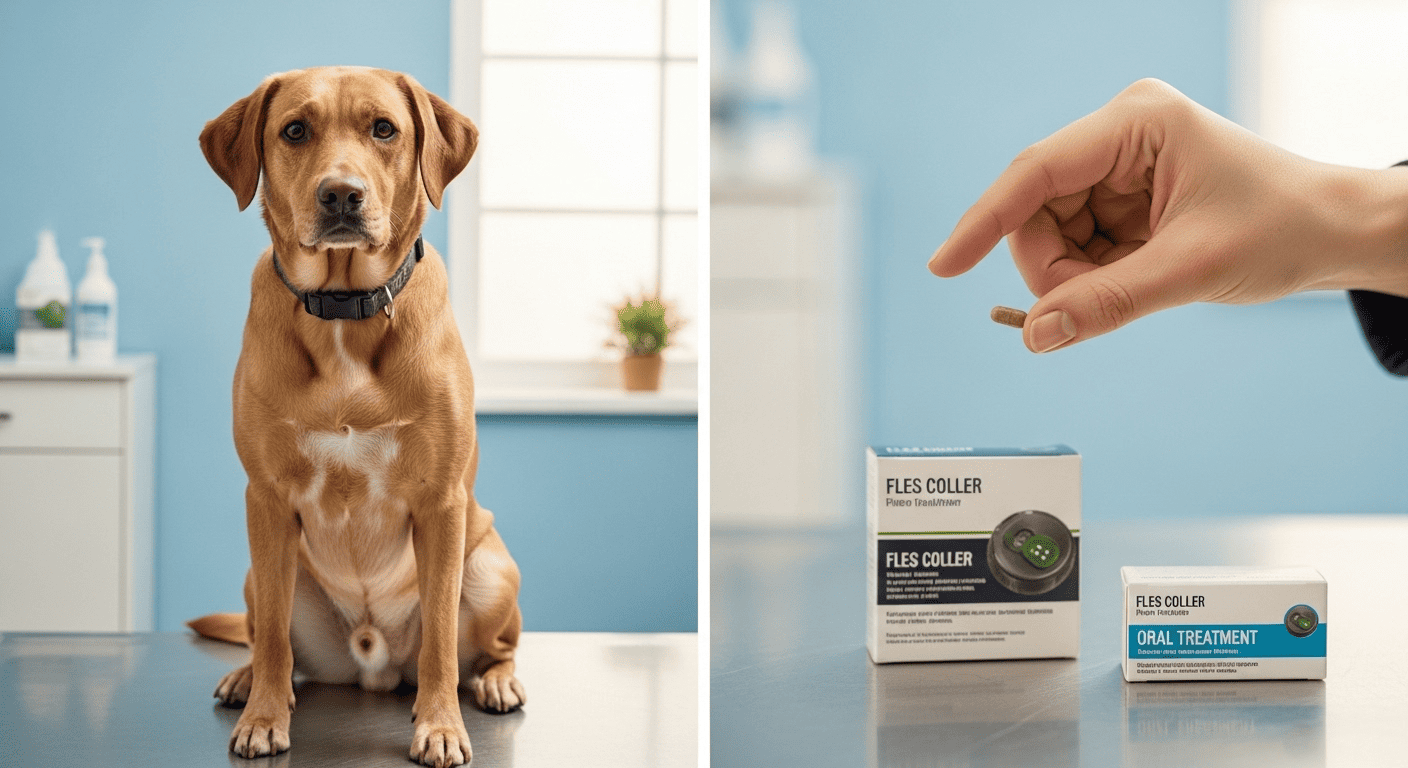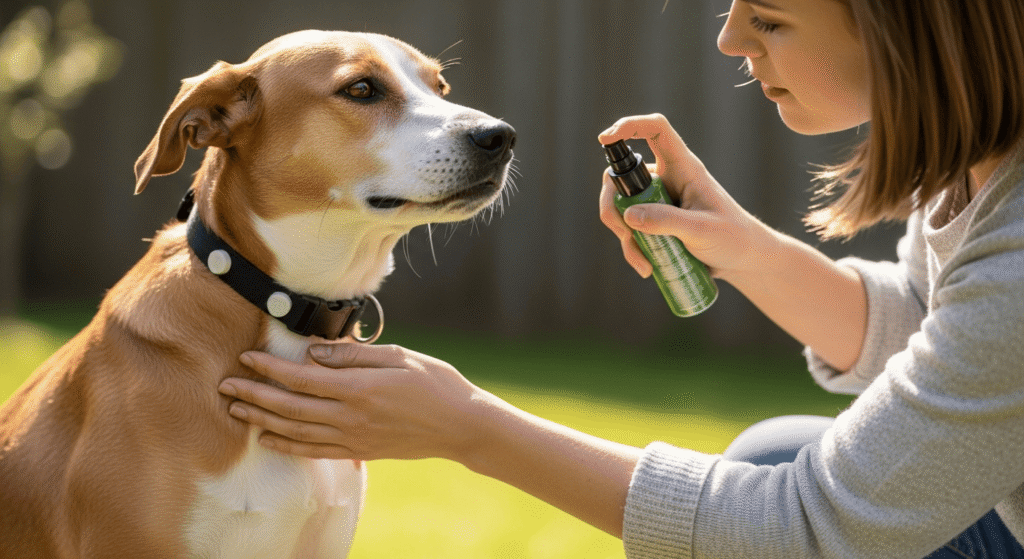Fleas might be nothing but a nuisance to your dog, but they can cause tremendous discomfort and medical problems if not taken care of. As dog owners, it is our responsibility to adopt effective methods to protect our dogs from those pesky parasites. Flea collars and oral medications are two of the most popular flea treatments available today.
But which one is truly best for your dog? In this comprehensive guide, we’ll pit flea collars vs oral medications, exploring their efficacy, convenience, safety, and more to help you make an informed choice for your pet’s health.
1. Flea Collars vs Oral Medications ,What they Are
It’s important to first understand what each treatment is and how they work before deciding on flea collars or oral medications.
Flea collars are a popular flea control technique where dogs wear them around their necks. Flea collars contain chemicals that are slowly released onto the dog’s coat and skin, providing continuous protection against parasites, fleas, and ticks. Flea collars are applied for several weeks to months based on the product brand and active ingredients. They are effective in warding off fleas and killing them, warding off infestations, and even alleviating symptoms like itching and irritation.
What Are Oral Medications?
Oral medications, on the other hand, are chewables or tablets that your dog swallows. Oral medications enter the bloodstream and target fleas after biting the dog. Some oral flea medications kill fleas within seconds, but others take their time. Oral medications are normally given monthly, but there also are medications that provide cover for extended periods, such as three months or even six months.
2. Effectiveness: Which is Better, Flea Collars or Oral Medications?
When choosing between flea collars and oral medications, their effectiveness is one of the most important factors to consider.
Flea Collars: Short-Term vs. Long-Term Protection
Flea collars offer extended protection, but they will not necessarily kill the fleas as quickly as oral medications. The collar chemicals are absorbed slowly by your dog’s skin and coat and will maintain extended flea control over an extended time. If your dog already has an active flea infestation, however, the collar might not alleviate the condition instantly.
Some flea collars also repel ticks and mosquitoes, as well as being pest-proof, so they are suitable for dogs that spend a lot of time outdoors.
Oral Medications: Quick Solutions
Oral medication, such as isoxazoline-containing drugs, is quick-acting. The pills kill fleas a few hours after ingestion, so if your dog already has fleas, they would be a good choice. Oral medications also help avoid re-infestation with future fleas because the drugs kill the fleas when they bite your pet.
Some of the oral medications, including Bravecto or NexGard, even include tick protection, which is an added barrier to protect dogs that go into areas where ticks are present.
3. Convenience and Ease of Use
Another factor to keep in mind is how simple each medication is to use and how easily it fits into your dog’s lifestyle.
Flea Collars: Long-Lasting and Low Maintenance
One of the advantages of flea collars is that they are easy to use. They last while being worn for weeks to months with minimal upkeep. This is an appropriate option for people who like a “set it and forget it” option. You simply need to ensure that the collar fits properly and swap it out when it has expired.
But for some others, the collar may be uncomfortable, especially when it’s fitted tightly or the dog has sensitive skin. One should check the collar from time to time so as not to irritate it.
Oral Medications: Quick Dosing, but Regular Administration
The oral medications are very easy to administer, especially if your dog enjoys treats or chewables. But they must be administered regularly—once a month, typically. If you forget a dose, your dog will not be protected against fleas for that interval.
Other dogs also resist oral medication, which is frustrating for owners. In such a situation, administering a pill pocket or food mixture is an ideal solution.
4. Safety and Side Effects
Safety should always be a priority while choosing a flea treatment for your dog.
Are Flea Collars Safe for Dogs?
Flea collars are generally safe for most dogs, but irritation, allergic reactions, or toxicity may occur under some circumstances. Some flea collars incorporate potent chemicals like permethrin or tetrachlorvinphos, which are poisonous when your dog licks the collar or is exposed to excessive levels of the chemical.
It’s important to monitor your dog for any adverse reactions, such as scratching, redness, or swelling around the neck area.
Are Oral Medications Safe for Dogs?
Oral medication is safe for the majority of dogs, but side effects are possible. Some dogs may experience mild gastrointestinal upset in the form of vomiting or diarrhea after the medication. Severe side effects, including seizures, are a possibility but unlikely and can occur with some brands, especially if your dog has an existing underlying medical condition.
Before applying oral flea medication, it’s absolutely important to consult your veterinarian, especially if your dog suffers from a history of seizures or other health issues.
5. Cost Comparison: Which One is Less Expensive?
The cost of flea treatment is another factor to consider, especially if you own a large dog or multiple pets.
Flea Collars: Upfront Expense with Recurring Use
Flea collars are cheaper in the long term because they are a one-time purchase that will last for months. Brand-wise and quality-wise, flea collars cost between \\$15 and \\$60, with some offering up to 8 months of protection.
Oral Medications: Reoccurring Costs
Oral medications must be taken each month, so the cost can be repeated over time. Treatment for a month of an oral flea medication might cost between $15 and $50, depending on the business and the dog’s size. While the upfront cost of oral medications is more, their rapid-acting formula and added protection for ticks and other bugs can be well worth the extra cost to some owners.
6. What is the Best Flea Treatment for Your Dog?
Your dog’s age, health, lifestyle, and the severity of their flea infestation finally decide what flea treatment is best suited for them.
- Flea Collars: Ideal for pet owners looking for a low-maintenance, long-term flea prevention method. For dogs that do not mind wearing a collar and have a lower likelihood of developing a severe flea infestation.
- Oral Medications: Ideal for dogs that have active flea problems or need relief promptly. Oral medication is also best for dogs with a higher risk of tick infestation.
Consult with your veterinarian at all times to determine the best possible option for your dog, considering their individual needs and medical history.
Conclusion
Both oral medications and flea collars are good flea protectants but both have advantages and disadvantages. Flea collars offer long-lasting, easy protection, and oral drugs provide fast, immediate relief. When choosing between oral medications and flea collars, consider the requirements, comfort, and your capacity to repeat the process for your dog. Always consult your veterinarian to determine the best flea treatment for your pet.
Frequently Asked Questions (FAQs)
Q1: Are oral meds and flea collars compatible?
A1: Yes, on special occasions, oral meds and flea collars can be used together for extra protection. Always check with your vet first before using together.
Q2: How long are flea collars effective?
A2: Most flea collars last 6 to 8 months, depending on the brand and chemical agents.
Q3: Do oral flea medicines affect the dogs in any way?
A3: While rare, a few dogs will experience a minor side effect like vomiting or diarrhea. Discuss with your vet if you do notice some unusual sign.
Q4: Do flea collars kill ticks?
A4: Some flea collars not only kill fleas but also ticks. Inquire about tick prevention on the product label.
Q5: How can I tell if my dog is allergic to flea collars?
A5: Watch for signs of irritation or allergic reaction such as redness, swelling, or excessive scratching around the neck area. If it persists, remove the collar and consult your vet.
Yuns Legdm is a passionate advocate for pet care and the founder of this website, dedicated to providing valuable information for fellow pet lovers and veterinary professionals worldwide. With a deep love for animals, Yuns created this platform to connect passionate pet owners with expert insights from veterinarians around the globe.
This website grows with you—the passionate pet owners and veterinary experts—creating a trusted space where knowledge, experience, and love for animals come together. Whether you’re seeking advice on pet health, nutrition, or general well-being, this platform is here to support you on your journey of responsible and loving pet care.





